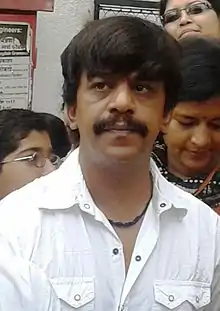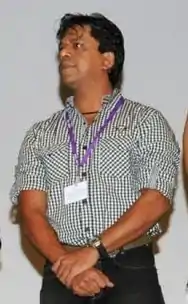Upendra Limaye
Upendra Limaye (born 8 November 1969) is an Indian film actor, who won the National Film Award for his role in the Marathi film Jogwa. [2][3]
Upendra Limaye | |
|---|---|
 | |
| Born | 8 November 1969[1] Pune, Maharashtra, India |
| Occupation | Actor |
| Spouse(s) | Dr Swati |
| Website | [http://www.upendralimaye.com |
]
On the centenary of Indian cinema in April 2013, Forbes included Limaye's performance in the film on its list, "25 Greatest Acting Performances of Indian Cinema[4]".
Biography
Upendra Limaye is a versatile actor who has performed a wide variety of roles on stage, screen and television, earning several prestigious awards for his acting.
He has acted in numerous experimental plays, Marathi parallel films, television serials, Hindi mainstream movies and a few South Indian films. He has worked with renowned stage and film directors like Madhur Bhandarkar, Ram Gopal Verma, Amol Palekar, Rajiv Patil, Jabbar Patel, Satish Alekar, Vinay Apte, Waman Kendre, Chandrakant Kulkarni, Anant Mahadevan, Karupaniannan and others.
He began acting in school, in plays organised for social gatherings. Developing a liking for the stage, in college he opted to major in dramatic art. While studying, he co-founded, with three like-minded friends, an Experimental Theatre platform called ‘Parichay’, which produced a variety of plays over the course of next 9 years. And his various roles in those plays established him as an accomplished actor and brought him into prominence. This led to parts in Marathi parallel cinema and eventually in Hindi mainstream movies.
A multi-faceted actor with an astounding range, he brings a searing intensity and honesty to his performances. When he commits to a role, he is known to go all the way to bring the character alive. His essential integrity illuminates and deepens even the most ordinary of the characters he portrays.
His fresh, sincere and inspiring approach to acting was evident in his lead role in the Marathi film, ‘Jogwa,’ directed by noted film maker Rajiv Patil. His controlled, understated yet forceful performance earned him the Best Male Actor award at the 56th National Films Awards in 2010, making him the first Marathi actor to be honoured with the distinction in the awards’ history. Besides ‘Jogwa’, he has appeared in several National award-winning films, like ‘Mukta,’ ‘Bangarwadi,’ ‘Sarkarnama,’ ‘Dhyasparva’, ‘Chandni Bar,’ ‘Page 3,’ ‘Traffic Signal,’ to mention a few. He continues to be in popular demand by Marathi, Hindi and South Indian film makers.
Upendra Limaye is married to Dr. Swati and has a daughter, Bhairavi and a son, Ved.
Family Background
He was the first member of his family to become a stage, television and screen actor. He had no hereditary ‘gift’ to bank on. Nor any of the advantages of the privileged. His rise as an acclaimed actor was the result of many unnoticed things. Passion, hard work, learning from actual experience, an open, enquiring, receptive mind avidly imbibing influences from all around him, humility to listen to and learn from the noted, established personalities in his field he came to work with, faith in himself. And, above all - as he frankly admits it - sheer luck. Luck in being at the right place at the right time and meeting the right people who gave him opportunities, boosted him, helped him hone his craft and evolve into a sincere, committed, professional artist.
Upendra Limaye was born and grew up in a middle-class, conservative family in Pune’s Sadashiv Peth. His upbringing was shaped by a curious mixture of both: orthodoxy and somewhat liberal leanings. His father’s side was strictly conventional, adhering to the respected, age-old traditions. But his mother’s family, living nearby, was somewhat open and liberal, drawn to humour, poetry, artistic pursuits, tasteful cinema etc. Thus, he grew up, assimilating the best of both. He respected traditions, yet harboured a yearning for innovation.[5]
School Plays
Upendra Limaye studied up to the 10th standard in New English High School, Tilak Road, Pune. He was more interested in extra-curricular activities than studies. This prompted him to start taking part in the school’s social gatherings plays. He didn’t know it then. But the seeds of his career were sown in those school dramas. The school nurtured the growth of dramatic art. And his drama teacher, Mrs Bhanutai, supported and encouraged him, boosting his confidence in his ability to act. He took part in several school drama competitions, also became the school’s cultural representative, and developed a real liking for drama.
For Junior College, he took admission in Bharti Vidyapeeth. Here, too, the cultural atmosphere was just right. He continued acting in plays, took part in various inter-collegiate drama contests, even won some awards for his acting. Yet, he remained merely curious about the field of acting, imbibing inputs for his craft from whatever sources were available at the time.
That changed in the 11th standard when one day he happened to see a professional drama called, ‘Padgham’, directed by Jabbar Patel. With its student union theme and powerful performances, ‘Padgham’ exerted a profound effect on Upendra. For the first time, he felt the sheer strength of drama. He sensed its amazing power to entertain, influence and move audiences. He was awed by its potential to offer artists a limitless field for personal creativity and expression. Now he knew he wanted to be an actor.
So, after the 12th exam, he told his family he was going to join Lalit Kala Kendra, the Centre for Performing Arts, to major in dramatic art. No one objected to his decision. His father just told him, "Do whatever you like to do, but be at the top!" A familial injunction he has scrupulously tried to fulfill till date.
Enrolling in Lalit Kala Kendra marked the first turning point in his life.
But immediately after joining the college, to earn his upkeep, he secured a job with Pune’s Alurkar Music House, the only regular job he has ever held. The job, as destiny would have it, lasted just a year. For not long after, he met three like-minded theatre devotees, Sanjay Pawar, Subodh Pande and Abhay Godse who, like him, yearned to do something different in the theatre field. So, in 1988, the four friends got together and founded an Experimental Theatre platform called ‘Parichay’, and launched their novel dramatic movement.
In the next decade, Upendra acted in numerous experimental and commercial plays (see Theatre). With his talent getting recognised and lauded, barely three years after the founding of Parichay, he began getting parts in Marathi parallel cinema, produced by well-known film makers. He was now a versatile and recognised actor.
Looking back now, he feels, "it was the best period of my life…a sort of romantic, idealistic phase where we dreamt of doing great work, of producing pure art without any commercial compromise."[5]
Filmography
Films
2019 - Satellite Shankar Hindi movie role of Thana Inspector of Chandrapur MH police station.
| Year | Title | Language | Role | Other notes |
|---|---|---|---|---|
| 1994 | Mukta | Marathi | Activist | |
| 1995 | Bangarwadi | Marathi | Shekoo | |
| Katha Don Ganpatravanchi | Marathi | Rohodas | ||
| 1998 | Sarkarnama | Marathi | Sapkale | |
| 2000 | Kairee | Marathi | Deshpande Teacher | |
| 2001 | Dhyasparva/Kal Ka Admi | Marathi/Hindi | Press Owner | |
| 2003 | Chandni Bar | Hindi | Gokul | |
| 2004 | Savarkhed: EK Gaav | Marathi | Surshya | |
| 2005 | Page 3 | Hindi | Inspector Bhonsale | |
| 2006 | Jatra | Marathi | Ramdas Mali | |
| Blind Game | Marathi | Karamchand | ||
| Shiva | Hindi | Bapu | ||
| Sivappathigaram | Tamil | Inspector | ||
| 2007 | Darling | Hindi | Inspector Bhaskar Reddy | |
| Traffic Signal | Hindi | Manya Langda | ||
| Pranali | Hindi | Sultan | ||
| 2008 | Urus | Marathi | Mahadev | |
| Sarkar Raj | Hindi | Kantilal Vora | ||
| Contract | Hindi | Goonga | ||
| 2009 | Made in China | Marathi | Kailash | |
| Jogwa | Marathi | Tayappa | Won Maharashtra State Government Awards for Best Actor National Film Award for Best Actor | |
| 2010 | Mee Sindhutai Sapkal | Marathi | Shrihari | |
| 2010-11 | Dhoosar | Marathi | Arjun | |
| 2010-11 | Mahaguru | Marathi | Shankar | |
| 2011 | My Name is 340 | Hindi | 340 | |
| 2013 | Kokanastha | Marathi | Gautam | |
| 2013 | Tuhya Dharma Koncha? | Marathi | Kavadu | |
| 2014 | Gunaaji | Konkani/Marathi/Hindi | Gunaaji | |
| 2014 | Yellow | Marathi | Swimming Coach | |
| 2017 | Vitha | Marathi | ||
| 2017 | Sur Sapata | Marathi | Anna Bhosale | |
| 2018 | Mulshi Pattern | Marathi | Vitthal | |
| 2020 | Bansuri: The Flute | Hindi | Maan Singh |

Television Shows
| Title | Year(s) | Role | Channel |
|---|---|---|---|
| Tara From Satara | 2019–2020 | Sachin Mane | Sony TV |
Awards
- Best Actor
Natya Gaurav Award Year : 1996 Play Jallai Tuzi Preet
- Best Actor
Kalnirnaya Award Year : 1996 Play Jallai Tuzi Preet
- Best Actor
Maharashtra Times Award Year : 2005 Film Page 3
- Best Actor
Hamlog Award Year : 2005 Film Page3
- Best Actor
Rashtriya Ratna Award Year : 2006 Film Page 3
- Best Actor
Kalarang Award Year : 2009 Film Sarkar Raj / Urus
- Year: 2009 National Film Award for Best Actor for the film Jogwa
- Best Actor
Shivaji Ganeshan Award Year : 2009 Film Jogwa
- Best Actor
V. Shantaram Award Year : 2009 Film Jogwa
- Best Actor
Baburao Painter Award Year : 2009 Film Jogwa
- Best Actor
Sanskriti Kaladarpan Award Year : 2009 Film Jogwa
- Best Actor
Maharashtra Times Award Year : 2009 Film Jogwa
- For Outstanding
Contribution to his Profession Maharashtra Ratna Puraskar Year : 2010
- For Outstanding
Contribution to his Profession Ninad Puraskar Year : 2010
References
- "Upendra Limaye Profile" (PDF). Archived (PDF) from the original on 23 November 2015. Retrieved 8 November 2015.
- "'जोगवा'साठी उपेंद्र लिमयेला राष्ट्रीय पुरस्कार". Maharashtra Times. 23 January 2010. Archived from the original on 26 January 2010. Retrieved 30 December 2011.
- Bramhe, Shripad (31 January 2010). "'तोयप्पा' साकारताना..." Sakaal. Archived from the original on 11 November 2011. Retrieved 30 December 2011.
- "25 Greatest Acting Performances of Indian Cinema | Forbes India". Forbes India. Archived from the original on 9 September 2017. Retrieved 5 October 2017.
- "Upendra Limye - Biography". www.upendralimaye.com. Archived from the original on 25 November 2019. Retrieved 23 June 2019.